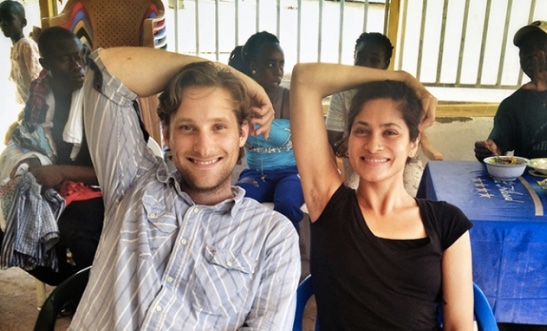Two Harvard-trained research-scientist entrepreneurs, who formed a close alliance while battling disease epidemics in West Africa, have launched a startup to develop a diagnostic technology designed to help women monitor their health and fertility without clinical assistance.
Stephen Gire and Ridhi Tariyal’s company aims to tackle “silent infections” such as endometriosis, polycystic ovarian syndrome, ovarian cancer, and uterine fibroids, as well as treatable infections like chlamydia or gonorrhea — reproductive disorders that if left unaddressed can inflict significant damage on women’s fertility over time, leaving some who had hoped to conceive discovering that the window of opportunity has closed.
 “It shouldn’t be like this,” observes Ms. Tariyal in a Harvard release by Caroline Perry. Tariyal and Gire want to get actionable health information into women’s hands before fertility problems arise due to conditions they may not even be aware they have. The researchers believe a solution would be a “smart tampon” system capable of detecting warning signs in menstrual blood.
“It shouldn’t be like this,” observes Ms. Tariyal in a Harvard release by Caroline Perry. Tariyal and Gire want to get actionable health information into women’s hands before fertility problems arise due to conditions they may not even be aware they have. The researchers believe a solution would be a “smart tampon” system capable of detecting warning signs in menstrual blood.
 Tariyal and Gire’s company, NextGen Jane, uses diagnostic technology developed at Harvard and will enter the product in a clinical trial this spring. The researchers explain that the company name is intended to evoke both the iconic strength of GI Jane and the vulnerability of a Jane Doe, as well as the founders’ next-generation sensibilities.
Tariyal and Gire’s company, NextGen Jane, uses diagnostic technology developed at Harvard and will enter the product in a clinical trial this spring. The researchers explain that the company name is intended to evoke both the iconic strength of GI Jane and the vulnerability of a Jane Doe, as well as the founders’ next-generation sensibilities.
“Your body is constantly talking to you,” the partners say, “letting you know when you are sick or exhausted. Biological markers are the words your body uses to communicate internally. What if you could decipher the language and listen to the chatter?” They contend that the dominant reactive healthcare management model — under which if you feel sick, you go to the doctor — is broken and especially prone to failure when it comes to the detection and timely diagnosis of asymptomatic conditions like chlamydia and gonorrhea.

“At NextGen Jane, we believe data can empower women,” they add. “We are developing a product which can help you understand what your body is trying to tell you and reveal important information about your health in the privacy of your home. When you’re constantly listening in to your body’s inner monologue and addressing issues at a nascent stage — at home, on your own time, with a device that fits into your schedule, you won’t have to make trade-offs between your health and the precious hours of your day.”
Tariyal and Gire say women should be rewarded for proactive health tracking with more free time, affirming: “We want to get you out of lines and waiting rooms by bringing our product to the privacy of your home … to reduce the uncertainty in our health in order to bring greater peace of mind.”
NextGen Jane’s principals maintain that multiple data points collected over a long span of time will be more informative in assessing health status than data collected in a single lab visit, saying: “We want to reduce the friction in the system that makes it difficult to track important health metrics about yourself on a more regular basis. That’s why we decided to invent around your day and find ways to integrate into your routine. It’s natural to worry but we want to relieve some of the stress by giving you the tools to manage your health with simple, effective strategies.”
Of course, there are issues that make things more complicated and potentially less effective, like sexually transmitted infections, menstruation, and fertility problems, discussion of which is taboo in many cultures, especially in developing nations. However, Tariyal and Gire are seeking to integrate user-friendly diagnostic technology into a routine that is unavoidable for many women, by leveraging an often-overlooked sample type. “The intent,” Tariyal tells Harvard’s Perry, “is to help you manage your health, from menarche to menopause.”
Gire and Tariyal initially met in the Harvard lab of associate professor Dr. Pardis Sabeti, a computational geneticist with expertise developing algorithms to detect genetic signatures of adaption in humans and the microbial organisms that infect people, and who studies deadly infectious diseases like Ebola, cholera, and malaria at Harvard’s Center for Systems Biology and at the Broad Institute of MIT and Harvard.
Dr. Sabeti is an associate professor at the Center for Systems Biology and Department of Organismic and Evolutionary Biology at Harvard, and the Department of Immunology and Infectious Disease at the Harvard School of Public Health, as well as an Institute Member of the Broad Institute of Harvard and MIT, and a Howard Hughes Investigator.
Gire started his research career at MIT’s Whitehead Institute for Biomedical Research, studying monkeypox in the Congo, until his advisor was suddenly accepted into NASA‘s astronaut training program. Dr. Sabeti had been a longtime collaborator, so Gire moved into her Harvard lab and remained there for seven years, heading up genomic initiatives in Nigeria, Sierra Leone, and Ghana.
Tariyal’s background was in industrial engineering, biomedical enterprise, and business, and when she also joined the Sabeti lab in 2011, the research team was expanding its efforts to understand the virus that causes Lassa fever, working on a hypothesis that a single gene might confer immunity to certain West African populations.
Tariyal and Gire, who were put in charge of designing a research study, spent seven weeks backpacking through Sierra Leone in 2012, camping outside and contacting patients who had survived Lassa fever, and collecting venous blood samples. Traveling from village to village, they also tried to obtain current addresses for families who had moved, while steering clear of Lassa outbreaks, and of scenes of political unrest in an election year. Blood samples collected were sent for genomic analysis.
“We went into it thinking, we’ll either be best friends or we’ll hate each other after this experience,” Gire tells Perry. Happily, the project cemented their friendship.
In 2013, Tariyal left the Sabeti lab to pursue her next opportunity: Harvard’s Blavatnik Fellowship in Life Science Entrepreneurship. Recognizing that entrepreneurs play a crucial role in successful commercialization of new biomedical technologies, the Blavatnik Fellowship is designed to foster entrepreneurial skills in the life sciences, and to link emerging business leaders with innovations from across Harvard University.
The fellowship program provides a select group of Harvard Business School MBA alumni the opportunity to work with Harvard inventors in promoting commercialization of life science technologies with market potential. Harvard’s i-lab serves as the hub, providing fellows with the space and opportunity to join an entrepreneurial community.
 The Blavatnik Fellowship, led by Vicki Sato, professor of Management Practice at Harvard Business School (HBS), invites recent MBA graduates back to campus to engage in the commercialization of Harvard technologies, particularly those receiving accelerator funding through Harvard’s Office of Technology Development (OTD).
The Blavatnik Fellowship, led by Vicki Sato, professor of Management Practice at Harvard Business School (HBS), invites recent MBA graduates back to campus to engage in the commercialization of Harvard technologies, particularly those receiving accelerator funding through Harvard’s Office of Technology Development (OTD).
Tariyal, who had attempted to launch a startup once before, a genomics company targeting emerging markets, explains in the release that it takes about two years to get over its failure. The Blavatnik Fellowship, Dr. Sato says, is designed to rally resources around young entrepreneurs, enabling them to capitalize on their business talent and potential, and passion for science and technology. “You can’t launch a company in isolation,” she says. “We provide them mentoring, space, and immersion in labs at Harvard and elsewhere as they contribute their entrepreneurial business skills to research projects that could become new ventures.”
 Under the Blavatnik Fellowship program, Tariyal approached George Whitesides, the Woodford L. and Ann A. Flowers University Professor in the Department of Chemistry and Chemical Biology. Dr. Whitesides, who holds some 130 patents, has many years of experience developing point-of-care medical diagnostics, including a blood test for sickle-cell disease.
Under the Blavatnik Fellowship program, Tariyal approached George Whitesides, the Woodford L. and Ann A. Flowers University Professor in the Department of Chemistry and Chemical Biology. Dr. Whitesides, who holds some 130 patents, has many years of experience developing point-of-care medical diagnostics, including a blood test for sickle-cell disease.
In the Whitesides lab, Tariyal worked with doctoral students and postdocs to investigate the presence of various hormones and biomarkers in body fluids — saliva and urine being standard samples. However, she discovered that many key biomarkers could only be found in blood, and blood from a finger stick was not sufficient in volume to build a robust product. “We had to make it easy. We needed a way to collect lots of blood, and preferably at home,” she says.
Then came an epiphany, the realization that if large amounts of blood are needed from women on a regular basis, post-pubescent and pre-menopausal women bleed every month.
Harvard OTD assisted her in protecting the intellectual property derived from her work under the fellowship, covering the costs of patent filing and assisting in the launch of NextGen Jane, introducing her to a wide network of entrepreneurs and potential investors.
Tariyal also credits Dr. Sato’s mentorship for a host of lessons learned, ranging from understanding the business of science to becoming an effective female leader — support that proved especially crucial when prospective investors expressed discomfort with the tampon concept.
Meanwhile, Gire had remained in the Sabeti lab during the West African Ebola outbreak, collecting samples in Sierra Leone and performing genomic analysis. This genomic sequencing experience proved invaluable in the next phase of the NextGen Jane ramp-up.

Tariyal and Gire located NextGen Jane’s head office in Oakland, California, and are devoted to the startup full time. A 2015 grant from the sequencing company Illumina, Inc., enabled them to further develop the capabilities of blood-based diagnostics, and tapping Illumina’s resources, they were able to examine RNA in blood samples to see how gene expression changes over time during the menstrual cycle — research that yielded further validation that menstrual blood could serve as the sample of choice for tracking reproductive health conditions.
The partners are now focusing on the detection of endometriosis, a painful condition affecting about 1 in 10 American women. In December 2015, NextGen Jane was accepted into the selective Illumina Accelerator, a program providing the company with additional funding through Viking Global, as well as research support, lab space, and access to sequencing technologies. Additionally, at the end of February, NextGen Jane reached a major funding milestone with investments led by Access Industries — the privately held investment company owned by Len Blavatnik, MBA 89, for whom the Blavatnik Biomedical Accelerator and the Blavatnik Fellowship are named.
This spring, Tariyal and Gire are collaborating with a leading endometriosis clinic to conduct a clinical trial using donated samples. They are seeking healthy female volunteers in the San Francisco Bay Area to participate in the trial.
“NextGen Jane is a strong example of what can happen when young entrepreneurs connect with science in a fertile environment,” observes Dr. Sato in the Harvard release. “The Blavatnik Fellowship program at HBS incubates both the leaders and the life science enterprises of the future. Science-based businesses can be transformative, but they present some of the toughest business challenges. Ridhi’s drive, persistence, and vision exemplify what it takes.”
“We wouldn’t be here without the vast support from Harvard and the mentors that pushed us forward despite the odds, Tariyal adds. “We’re looking to start a revolution in women’s health, and we’re betting on women being smart as hell, really savvy, and knowing how to manage this stuff.”
Sources:
Harvard Office of Technology And Development
NextGen Jane

